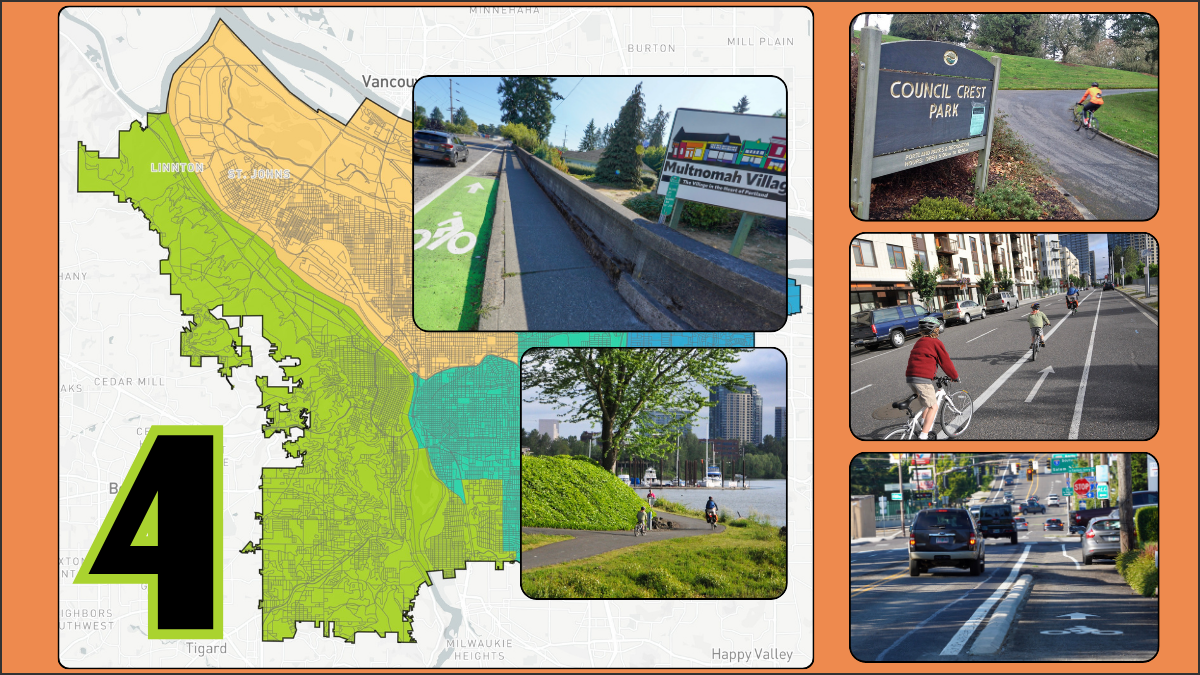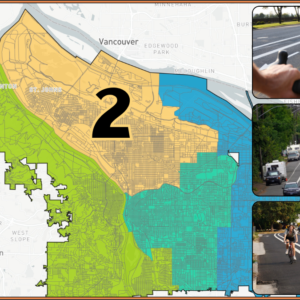Hold onto those ballots! Especially if you live in City Council District 4. Because I’ve just uploaded a new podcast episode where Lisa Caballero and I dish and debate the D4 race.
Barring any changes in plans, I’m done with individual candidate interviews as we are in the final few weeks before ballots are due. Now I want to focus on more general analysis of each district and the mayor’s race. So I asked Lisa to join me in the Shed yesterday because she’s lived in D4 for over twenty years and just as obsessed with this election as I am. Lisa has also done neighborhood-level activism in those years and she’s hosted and attended a bunch election-related events in recent months.
In this episode, we talked about who we think are the 12-13 most viable candidates in the field. Since Olivia Clark, Eric Zimmerman, and Eli Arnold nabbed endorsements from the two biggest media outlets in town (The Oregonian and Willamette Week), we talked about them the most. “I think it’s hard to ignore those endorsements,” Lisa said about how those three candidates have emerged this week. “If I were another District 4 candidate, I would be feeling a little down right now.” We also shared our thoughts on other front-of-the-pack candidates like Mitch Green, Chad Lykins, Lisa Freeman, Bob Weinstein, Stan Penkin, Moses Ross, Ben Hufford, Sarah Silkie, and Tony Morse.
How are they on transportation issues? It’s a mixed bag and we didn’t share all their positions. I used a question The Oregonian asked every candidate as a jumping-off point: “Which would you prioritize: Creation of more protected bike lanes and priority bus lanes or improved surfacing of existing degraded driving lanes?” I realize that’s an annoying binary that doesn’t appreciate the reality of funding, but it was fun to see how the candidates answered.
In Lisa’s mind, what’s important isn’t whether or not a candidate nails a bike-related question. She wants someone with experience and the political moxie to make progress — and most importantly someone who can work with others so the sum of council is greater than it’s individual parts. “We have a lot of candidates with experience, and especially Eric and Olivia, they’ve got more experience than anybody running for mayor,” Lisa said. “We don’t have someone who can design a bike lane… So I have a fantasy of Olivia Clark having a weekly breakfast with (D1 candidate) Steph Routh… Likewise, I think it would be really cool if Eric Zimmerman and (D1 candidate) Timur Ender had coffee every once in a while.”
A red flag for Lisa is anyone she feels is too dogmatic. “I don’t want people with purity tests. I want someone who can talk to someone who doesn’t see eye-to-eye, listen to them, perhaps learn from them and persuade them.”
No matter how things turn out once all the votes are tallied, Lisa is sanguine about the new form of government and the influence on ranked choice voting. Beyond the three who win seats, Lisa says, “We’ve got another nine who are going to be very well-informed about the district. And what a wonderful process this has been! It has created nine people who are not going to be on City Council, who are going to be able to advocate, and who have spent a lot of volunteer time really getting to know this area. That’s a win-win for everybody.”
Listen to the full episode in the player above or wherever you get your podcasts.
Links for this episode:








Thanks for reading.
BikePortland has served this community with independent community journalism since 2005. We rely on subscriptions from readers like you to survive. Your financial support is vital in keeping this valuable resource alive and well.
Please subscribe today to strengthen and expand our work.
I wanted to add a note to the podcast, which I’ve listened to once. I thought Jonathan and I had talked about the difference between the Oregonian and Willamette Week endorsement process. Either I’m remembering wrong, or it got edited out. Let me add some thoughts.
The Oregonian endorsed three top candidates, out of six interviews, but the WW ranked a ballot of six candidates — broken into a top three and then the next three. The other three candidates who were ranked by WW were Sarah Silkie, Bob Weinstein and Mitch Green.
Candidates who were also interviewed, but not endorsed, by the O were Chad Lykins, Lisa Freeman and Bob Weinstein.
Personally, I found the WW write up more informative because they explained their reasoning for supporting each candidate. I also liked their final, fun question, “What were you known for in high school?”
https://www.wweek.com/news/2024/10/16/wws-fall-2024-endorsements-portland-city-council-district-4/
I disagree with Lisa on Zimmerman; he has stated that ALL his focus during his 2 years will be on the homeless, apparently mostly Downtown. That means 2 years of nothing else in the district getting his attention – long time to let things lie fallow. Even on homelessness, does he tell Eli that Sellwood can lump it with the campers in Oaks Bottom, because Downtown?
I suppose if he is elected, the other two can tell him ‘tag; yer it’ on the issue and let him deal with it alone while they tend to the ret of the district and city… Politicians love a good fall guy.
I do agree with her that D4 has a good crop of candidates, and many are aware of local transpo issues and take them seriously, and not just as a campaign promise. No-one offered ‘a bike lane in every pot!’
This was a fun podcast. Thanks.
Bob Weinstein
Candidate, Portland City Council District 4
But as a D4 voter I would be feeling inspired with pragmatic candidates such as Eli Arnold, Eric Zimmerman, Olivia Clark and Bob Weinstein leading the pack.
I do too. Endorsers have a lot of power in this election.
I agree. Due to the more confusing voting scheme (multimember RCV with STV) and the crazy number of candidates endorsers have too much sway. It’s now too overwhelming for most voters to do their own due diligence. This is unfortunate and I feel disenfranchises voters.
Maplewood has a bike bus! love seeing them all rolling down Mutnomah Blvd from Multnomah Village!
Two decoys for every duck (and that from a NYC transplant)! Love it.
Lisa is on the mark about ranked choice voting asking more of voters. That’s one of its most understated benefits. It asks voters to invest more in their vote and encourages the deeper attention and participation from voters we need in, all, but especially municipal elections. She made also made the related point that all the candidates and campaigns are engaging and building knowledge of a large swath of folks who won’t win but will be well positioned to take on other leadership opportunities.
I actually have the opposite take. Voters barely have enough time/energy/will to do due diligence on measures or our candidates via our current standard voting system. Just look at a the remorse over and reversal of recent measures (Measure 110) and votes (DA Mike Schmidt). “Asking more” is a move to further disenfranchise voters especially those that don’t have the free time or bandwidth to deal with the added complexity. There is a reason many now want to repeal RCV. City of Oakland CA and state of Alaska being 2 examples.
https://oaklandside.org/2024/02/12/oakland-group-aims-to-get-rid-of-ranked-choice-voting/
https://www.alaskasnewssource.com/2024/09/17/ballot-measure-2-will-alaskans-repeal-ranked-choice-voting-open-primaries/
Alaskan Republicans want to repeal it because their chosen candidates didn’t win. More moderate candidates did. One of the benefits of RCV!
Just FYI, Black Oaklanders are the ones spearheading the RCV removal.
https://www.prnewswire.com/news-releases/oakland-naacp-demands-manual-recount-in-mayors-race-alameda-county-lacks-transparency-with-errors-in-ranked-choice-voting-algorithm-301712414.html
There was a candidate that was pretty close to the median Alaskan voter, and that candidate lost due to a quirk in the counting. People who voted for the far-right candidate essentially elected the one on the left, a result that makes little sense to many Alaskans.
Was the ‘quirk’ Sarah Palin telling voters to put her name in every slot, instead of putting Begich second, which would have made him winner? Sounds more like ‘play stupid games…’ than a quirk.
IIRC voter approval for RCV in Alaska was still almost 60% (versus maybe 80 before election).
I suspect the Oakland problem is less RCV and more, well, Alameda County.
“Was the ‘quirk’ Sarah Palin telling voters to put her name in every slot”
No, because her second place voters were never considered so it doesn’t matter what they did. By voting for Palin, people helped elect the Democrat. That’s the part that doesn’t make sense.
We will know in 3 weeks if Alaska voters feel well served by their system of voting.
OK, I’ve been reading this all morning. Here goes. Back when I looked this up several weeks ago, what I remember is that Palin told her supporters not to rank her fellow R opponent. It doesn’t matter who her supporters ranked 2nd (or not), the other guy’s supporters were so pissed off that they refused to rank Palin. And that cost her the needed transfer votes to win. She’s never been a real bright bulb.
I don’t care what Alaskans think, we’ll know what we think in a couple weeks.
I don’t think Palin should have won either. The point is that voting for one candidate should not increase the odds of someone on the opposite end of the spectrum winning. It’s a perverse outcome.
I think in our case, the mayoral election will reach some sort of reasonable looking outcome, and the council seats are so confusing that unless there’s some weird racial dynamic, it’s going to seem ok. I don’t expect this election will make people regret choosing the new election system.
If you only rank one candidate and your candidate gets eliminated, then you don’t participate in the subsequent rounds of counting — your ballot is exhausted. I don’t think it is very hard to understand.
If you have a candidate you really don’t want to win, a voter should not rank the noxious candidate at all. But the voter should consider building a little wall with ranked candidates they can tolerate.
It’s not at all to understand. What what is hard to understand is why voting for a far right candidate should help elect the left-most candidate.
I understand the math, but find the outcome perverse.
https://fairvote.org/report/fewest-votes-wins-2024/
And Lisa provided the part I forgot – Palin pissed off the other Rs.
Well in Alaska a Democrat was elected when most voters wanted a Republican. Is that democratic? I may be wrong but if we in Oregon (with a strong Democratic majority) elected a Republican I’m guessing you wouldn’t be so happy.
If Democrats had followed the advice of an egotistical moron to try and game a system they didn’t understand, I’d say the Democrats deserved the outcome.
Yes, it is. Everyone knew the rules and made their choices accordingly.
It’s like the Electoral College — it’s the system in place, and if folks no longer like it, there’s a process for changing it.
Though I find Alaska’s outcome perverse, the election was fairly conducted and I respect the results.
I couldn’t disagree more. When it comes to our democratic rights and responsibilities, it is low expectations of ordinary people’s ability and desire to participate and shape the decisions that impact their lives that serves to disfranchise them. If you expect more from people you will, overtime, get more….and that obviously threatens those who benefit from the status quo. We all benefit from more people more meaningfully involved and we further dumb down our democracy at our peril.
So let’s make it harder for time-stressed low-income people to exercise their so-called responsibilities?
The happy median here would have been STAR voting. It’s frustrating that the Charter Commission didn’t go that direction for us, instead choosing this overly complex STV method.
That is some Orwellian newspeak. A voting system that more accurately reflects the desires of the voting public is disenfranchisement. It’s literally the exact opposite.
Not at all; if the system for accurately expressing your desires on a ballot is so complex that voters have difficulty using it effectively, the system could effectively disenfranchise voters. A simple example is a written STAR* ballot in an illiterate population. Another is a ballot that takes hours to fill out.
Voting systems can absolutely provide a near perfect ability to express while effectively disenfranchising.
*”Hot or Not” voting to those of who remember the internet before Facebook.